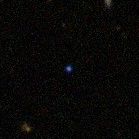SDSS J090745.0+024507
| Observation data Epoch J2000 Equinox J2000 | |
|---|---|
| Constellation | Hydra |
| Right ascension | 09h 07m 44.9925s[1] |
| Declination | +02° 45′ 06.877″[1] |
| Apparent magnitude (V) | 19.84[2] |
| Characteristics | |
| Spectral type | B9 V[3] |
| Variable type | SPB[3] |
| Astrometry | |
| Radial velocity (Rv) | +853 ± 12[4] km/s |
| Distance | 230000 ly (71000[3] pc) |
| Details | |
| Temperature | 10,500[3] K |
| Other designations | |
| Database references | |
| SIMBAD | data |
SDSS J090744.99+024506.8 (SDSS 090745.0+024507) is a short-period variable star in the constellation Hydra. It has a Galactic rest-frame radial velocity of 709 km/s.[3]
Its effective temperature is 10,500 K (corresponding to a spectral type of B9) and its age is estimated to be at most 350 million years. It has a heliocentric distance of 71 kpc. It was ejected from the centre of the galaxy less than 100 million years ago, which implies the existence of a population of young stars at the galactic centre less than 100 million years ago.[3]
Christened by the astronomer Warren Brown as the "outcast star", it is the first discovered member of a class of objects named hypervelocity stars.[6] It was discovered in 2005 at the MMT Observatory of the Center for Astrophysics | Harvard & Smithsonian (CfA), by astronomers Warren Brown, Margaret J. Geller, Scott J. Kenyon and Michael J. Kurtz.[4]
See also
[edit]- List of star extremes
- S5-HVS1 – another fast moving star
- US 708 – another fast moving star
References
[edit]- ^ a b Brown, A. G. A.; et al. (Gaia collaboration) (August 2018). "Gaia Data Release 2: Summary of the contents and survey properties". Astronomy & Astrophysics. 616. A1. arXiv:1804.09365. Bibcode:2018A&A...616A...1G. doi:10.1051/0004-6361/201833051.
- ^ Brown, Warren R.; Geller, Margaret J.; Kenyon, Scott J.; Kurtz, Michael J.; Bromley, Benjamin C. (2007). "Hypervelocity Stars. III. The Space Density and Ejection History of Main-Sequence Stars from the Galactic Center". The Astrophysical Journal. 671 (2): 1708. arXiv:0709.1471. Bibcode:2007ApJ...671.1708B. doi:10.1086/523642. S2CID 15074398.
- ^ a b c d e f Cesar I. Fuentes; K. Z. Stanek; B. Scott Gaudi; Brian A. McLeod; Slavko B. Bogdanov; Joel D. Hartman; Ryan C. Hickox; Matthew J. Holman (21 July 2005). "The Hypervelocity Star SDSS J090745.0+024507 is a Short-Period Variable". The Astrophysical Journal. 636 (1): L37. arXiv:astro-ph/0507520. Bibcode:2006ApJ...636L..37F. doi:10.1086/499233. S2CID 14266685. Accessed 18 January 2016.
- ^ a b Brown, Warren R.; Geller, Margaret J.; Kenyon, Scott J. & Kurtz, Michael J. (2005), "Discovery of an Unbound Hypervelocity Star in the Milky Way Halo", Astrophysical Journal, 622 (1): L33–L36, arXiv:astro-ph/0501177, Bibcode:2005ApJ...622L..33B, doi:10.1086/429378, S2CID 14322324
- ^ "[BGK2006] HV 1". SIMBAD. Centre de données astronomiques de Strasbourg. Retrieved 25 June 2020.
- ^ Berardelli, Phil (10 February 2005), "In The Stars: Odd Stars, Odder Planets", Space Daily
Further reading
[edit]- Gualandris, Alessia; Portegies Zwart, Simon & Sipior, Michael S. (2005), "Three-body encounters in the Galactic Centre: the origin of the hypervelocity star SDSS J090745.0+024507", Monthly Notices of the Royal Astronomical Society, 363 (1): 223–228, arXiv:astro-ph/0507365, Bibcode:2005MNRAS.363..223G, doi:10.1111/j.1365-2966.2005.09433.x, S2CID 15437038
- Brown, Warren R.; Geller, Margaret J.; Kenyon, Scott J. & Kurtz, Michael J. (2006), "A Successful Targeted Search for Hypervelocity Stars", Astrophysical Journal, 640 (1): L35–L38, arXiv:astro-ph/0601580, Bibcode:2006ApJ...640L..35B, doi:10.1086/503279, S2CID 17220212
- Fuentes, Cesar I.; Stanek, K. Z.; Gaudi, B. Scott; et al. (2006), "The Hypervelocity Star SDSS J090745.0+024507 Is Variable", Astrophysical Journal, 636 (1): L37–L40, arXiv:astro-ph/0507520, Bibcode:2006ApJ...636L..37F, doi:10.1086/499233, S2CID 14266685
- Bromley, Benjamin C.; Kenyon, Scott J.; Geller, Margaret J.; et al. (2006), "Hypervelocity Stars: Predicting the Spectrum of Ejection Velocities", Astrophysical Journal, 653 (2): 1194–1202, arXiv:astro-ph/0608159, Bibcode:2006ApJ...653.1194B, doi:10.1086/508419, S2CID 16202860

